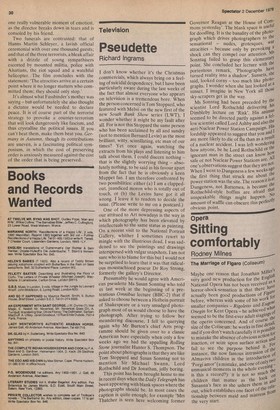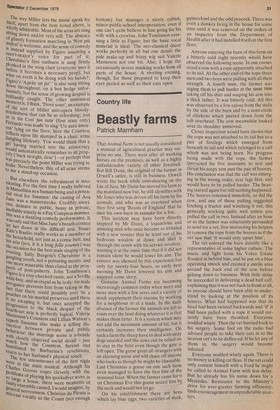opera
Sitting comfortably
Rodney Milnes
The Marriage of Figaro (Coliseum) Maybe one reason that Jonathan Miller': very good new production for the Englis': National Opera has not been received as horror-shock-sensation is that there have actually been good productions of Figar° before, whereas with some of his work f01 smaller companies — Rigoletto and Eugeget One gin for Kent Opera — he achieved whaf seemed to be the first-ever adult stagingsf, the operas concerned. And of course rt!','" size of the Coliseum: he works in fine det.al_' and if you don't watch carefully it is possibi! to mistake the absence of obvious action Ord inaction, or seize upon surface actio.n an! fail to see the purpose behind instance, the now famous intrusion of °if Almaviva children in the introduction °,.'• Porgi amor' (a mistake, and one of onl). twii, unmusical moments in the whole eventrig,e is this a record?): it is not so much tu_. children that matter as the look csud Susanna's face as she ushers them in aL out, which establishes one facet of the re': tionship between maid and mistress the very start. The way Miller lets the music speak for itself, apart from the item noted above, is Wholly admirable. Most of the arias are sung sitting down and/or very still. The absence, of ghastly formation marching in Non pm a ndrai' is welcome, and the sense of comedy is instead supplied by Figaro assuming a sarn't-major's voice for part of it; Cherubino's first outburst is sung firmly Plonked in the wing chair (everyone uses it before it becomes a necessary prop), but What on earth is he doing with his hands?; Figaro's `Aprite un p0' 'is also sung sitting dovvn throughout, on a box hedge unfortunately, but the sense of growing despair is brilliantly caught. The other unmusical moment is, I think, 'Dove sono', an example of the sort of Miller anti-opera bloodymindedness that can be so refreshing; just as in his Cosi fan tutte (first state only) Ferrando was made to sing `Un aura amorosa' lying on the floor, here the Countess reflects upon life slumped in a chair, arms dangling lifelessly. You would think that a gel having married into the aristocracy would automatically remember to sit properly back straight, dear') — or perhaps that was precisely the point Miller was trying to make. Nevertheless, this, of all arias, seems to me a stand-up occasion.
. But elsewhere the refreshment is into.xefing. For the first time I really believed in l Marcellina as a human being and a poten tial rival for Susanna: the casting of Ava June was a masterstroke. Credibly uxori?us, demure in public, bossy in private, ineffably stately in a Fay Compton manner, this was a dazzling comedy performance. It was only sad that MissJune's breath-control let her down in the difficult aria. Stuart Kale's Basilio really works as a member of the household, not just as a comic butt, and his aria (yes, it is a long folle journee) was the occasion for the best male singing of the evening. Sally Burgess's Cherubino is a gang]; • ng youth, not a posturing mezzo, and One more miserable than elated at the prospects of post-puberty. John Tomlinson's Figaro is a rosy-cheeked rustic, not a Seville wide-boy, and as stupid as he is sly: his male rogance prevents him from taking in the fact that there could possibly ever be a Poacher on his marital preserves until there is no escaping it, but once accepted the progression to the black despair of the .t.ourth-act aria is perfectly logical. Valerie Masterson's Countess and Lillian Watson's Su. Peri) Susanna also make a telling dis unction between private and public behaviour: the marriage scene is a-bristle With closely observed social detail — just watch how the Countess, furious and humiliated by Barbarina's revelations, reacts to her husband's physical touch. Were The few uneasinesses of the first night _ere in the main musical. Although Sir Charles Groves copes cleverly with the Problems of playing his quicksilver score in large a house, there were moments of faulty ensemble caused, I would imagine, by tneral nervousness. Christian du Plessis is is-cast vocally as the Count (not enough bottom) but manages a nicely coltish, minor-public-school interpretation, even if one can't quite believe in him going for his wife with a crowbar. John Tomlinson oversang a little as Figaro, but the basic vocal material is ideal. The neo-classical decor works perfectly in all but one detail: the pale make-up and frizzy wig suit Valerie Masterson not one bit. Also, I hope the occasionally severe masking works from all parts of the house. A riveting evening, though, for those prepared to keep their eyes peeled as well as their ears open.







































 Previous page
Previous page